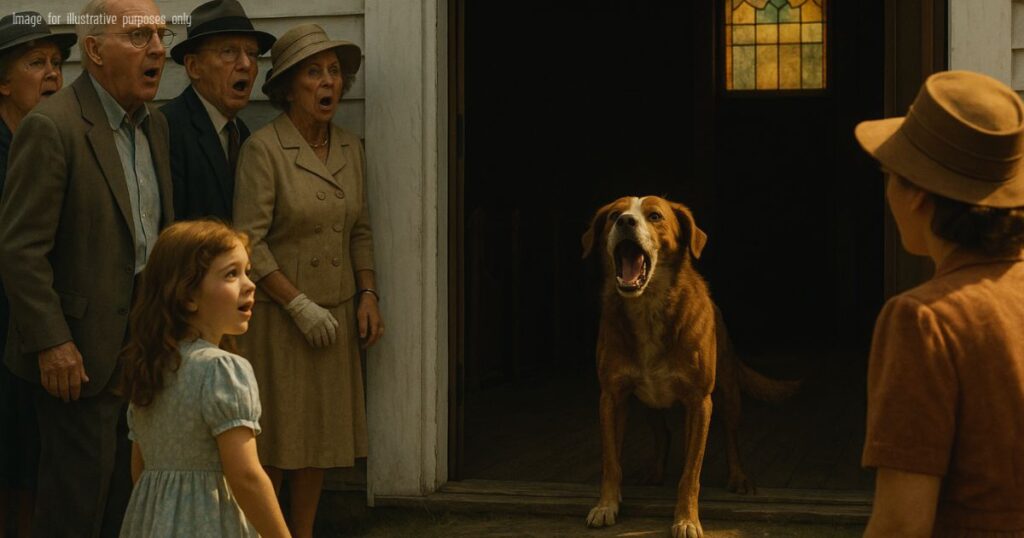Part 5: What Mercy Left Behind
Late Spring 1978 – McCall, Alabama
By Monday morning, the harmonica had become a relic.
Jewel placed it gently in the church’s glass case—the one that once held baptismal records and yellowed wedding photos from the 1930s. She labeled it simply:
“Clarence Trotter’s Harmonica – Returned by Mercy.”
Below it, she added in cursive:
“A song carried home by four paws and grace.”
No one disputed its place.
No one questioned the timing.
McCall, Alabama had seen stranger things. But never something that felt so…right.
Mercy didn’t come that Sunday.
Nor the next.
Elsie sat on the back pew with a hand open beside her, brushing the space where his head used to rest.
She left scraps of chicken, bits of biscuit, a small tin bowl of rainwater.
But nothing was touched.
Not even by raccoons.
As if nature itself was keeping vigil.
One afternoon, Sheriff Hank Boudreaux parked his cruiser by the cemetery and walked into the woods behind the church.
Didn’t say why.
Didn’t tell anyone he’d seen something in a dream.
He just walked, slow and deliberate, boots crunching old pine needles, until he came to the hollow tree near the creek—the one kids used to hide bottles in during the war, and where Clarence once carved his initials back in ’42.
And there, tucked in the roots, he found it.
A shallow nest of crushed leaves.
A circle worn in the ground.
And one red thread—likely from a handkerchief.
Still damp with rain.
Still warm to the touch.
Hank didn’t say a word to the press.
Didn’t put it in his logbook.
He just told Preacher Myron, “He laid down easy. Like he knew he was done.”
The next Sunday, Elsie found something under the pew.
Not Mercy. Not fur. Not pawprints.
A single white magnolia blossom.
Fresh. Open wide.
Set gently atop a square of paper.
On it, in childlike handwriting:
“He came for you.
He stayed for us.
He left so we’d remember.”
Jewel turned it over.
Blank on the back.
No name.
No smudge of ink.
Just that flower, that note, and the echo of a sigh in the sanctuary air.
For weeks, people kept returning to the pew.
Some sat beside it in silence.
Others brought photos of loved ones lost—husbands, daughters, friends long gone—and placed them on the cushion like Mercy might carry their names to wherever he’d gone.
Mrs. Thelma finally brought Scout’s old collar, long stored in a hatbox under her bed.
She laid it down with shaking hands.
“I was wrong to think it was just a dog,” she whispered. “He was a bridge.”
Children took to calling it “Mercy’s Bench.”
Even the mayor used the name when she declared it an official historic seat of McCall, Alabama.
“Let it never be dusted,” she said. “Let it always be kept warm, as best we can.”
And they did.
One evening, as fireflies lit the edge of the churchyard, Elsie knelt beneath the pew with a notebook.
She drew Mercy there—curled, eyes soft, tail curved like a comma at the end of a sentence not yet finished.
Above him, she wrote in neat block letters:
“The pew remembers.
Even if no one else does.”
And on the first Sunday of June, the organ creaked, the bell rope still broken—
And just before the first note rang out—
A bark echoed from the far corner.
Low.
Familiar.
Steady.
Elsie smiled.
Not startled.
Not surprised.
Only certain.


